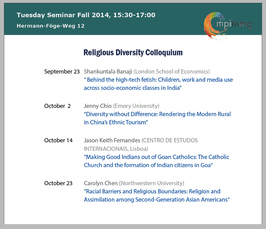"Poor@Play: Digital life beyond the West"
Religious Diversity Colloquium Winter 2014/15
- Date: Nov 25, 2014
- Time: 03:30 PM - 05:00 PM (Local Time Germany)
- Speaker: Payal Arora (Erasmus University Rotterdam, The Netherlands)
- Payal Arora is the author of several books including Dot Com Mantra: Social Computing in the Central Himalayas (Ashgate, 2010) and The Leisure Commons: A Spatial History of Web 2.0 (Routledge, 2014; Winner of the EUR Fellowship Award) as well as co-author of The Shape of Diversity to Come: Crossroads in New media, Identity & Law (in press; Palgrave) and Poor@Play: Digital Life beyond the West (expected 2016; Harvard University Press). Her paper on digitization of information won the 2010 Best Paper Award in Social Informatics by the American Society for Information Science and Technology (ASIS&T). Her focus and expertise lies in the anthropology and sociology of new technologies, specifically their digital cultures and social activism. She has consulted for both the private and public sector worldwide including with Shell, World Bank, hp, National Health Foundation, The Ministry of Education in Jordan, Sotheby’s, Art Review, Kellogg and the Beirut Chambers of Commerce. She is currently a GE Fellow on the Industrial Internet Project. She sits on several boards including the Global Media Journal, The South Asian Media, Arts & Culture Research Center in University of North Texas, Young Erasmus, Makerocity, and The World Women Global Council in New York. She holds degrees from Harvard University (M.Ed., International Policy) and Columbia University (PhD, Language, Literacy & Technology). She is currently based in the Department of Media and Communication, Faculty of History, Culture and Communication at Erasmus University Rotterdam, The Netherlands. For more detail, please check her website: www.payalarora.com
- Location: MPI-MMG, Hermann-Föge-Weg 12, Göttingen
- Room: Conference Room

For more details please contact vdvoffice(at)mmg.mpg.de.
Instagram of newlyweds, downloading the latest movies, teens flirting on Whatsapp and virtual gaming may seem like typical behavior in the West. Yet, in the context of a village in Mali or a favela in Brazil, it is seen as unusual and perhaps an anomaly in their new media practices. In fact, most current research relegates such online behavior as anecdotal. This is partly due to the fact that much research on the poor’s usage of the internet in emerging economies is driven by development agendas with a strong historical bias towards the socio-economic focus. Data that does not directly address project-based outcomes is sidelined. However, as emerging economies globalize and urbanize exponentially, and their users become more critical consumers and creative contributors of digital content, a paradigm shift is needed that views this new media audience with a more open-ended, explorative and pluralistic perspective. This presentation draws from an ongoing book project (Harvard University Press, due 2016) that focuses on the implications and impacts of ICTs as leisure (entertainment/pleasure/play) artifacts in the context of developing economies. It will make the case that a critical movement is needed among scholars focusing on emerging economies to re-conceptualize the mobilization and serviceability of ICTs and extend it beyond a conservative understanding of developmental value. Here, we investigate the digital lives of the global South and reveal popular Western-centric assumptions and concerns. After all, girls in Riyadh displaying their fashion on YouTube can hardly be viewed through the same lens as those from say, Los Angeles. Such playfulness with media can have deadly consequences. Fake online identities in Mumbai slums versus a suburb in Utah have different levels of acceptance and motivations. With outsourcing of game play to China, digital labor and leisure gain a complicated narrative, distinct from the wealthy nations. And while studies have shown that farmers in Bangladesh consume pornography online just as intensely as those in the West, their lives tell us of diverse local struggles with the opposite sex. Overall, by moving away from the utilitarian and focusing on the social and the leisurely, it is worth questioning the conventional framing of the poor as virtuous and passive audiences that primarily use new media platforms to gain employment, check farm prices, health information and education for their children. By investigating the online sociality, play and entertainment of users in the developing world, we can gain a truly global picture of digital life in contemporary society.